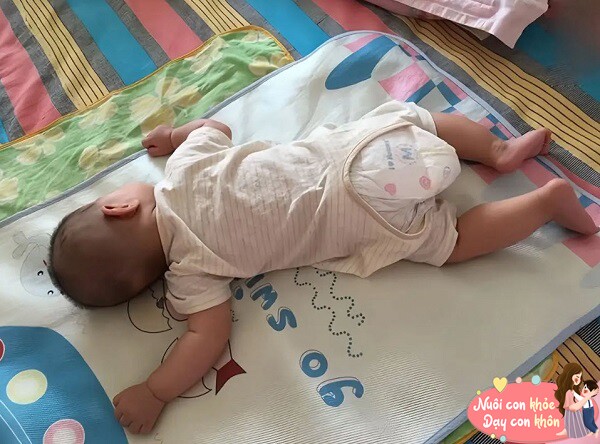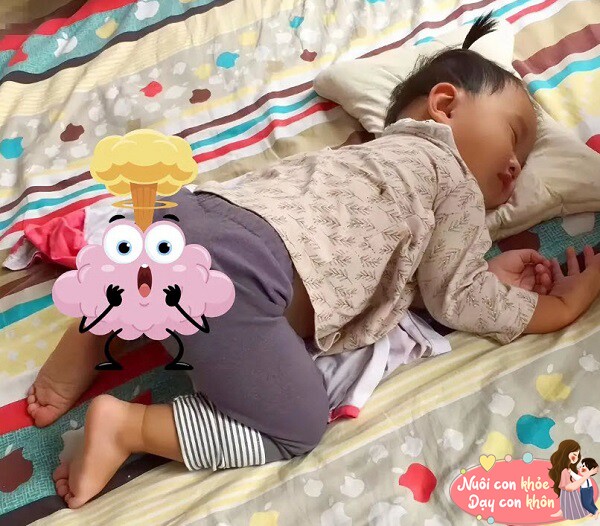But is the child truly uncomfortable? If your child is used to sleeping on their stomach, should you turn them over after they fall asleep? In fact, there are reasons why children prefer to sleep on their stomachs. Parents need to understand the underlying causes and then adjust accordingly.

Sleeping on the stomach can feel safer
For infants, sleeping on their stomach can better simulate the position they were in while in the womb. When in the womb, the baby is enclosed in a small, warm, and cozy space.
In the womb, the baby is wrapped tightly by the amniotic fluid and the mother’s muscles, creating a feeling of lying on a “small bed” of security. While in this space, the baby can sense the mother’s heartbeat and breathing, which not only helps the baby relax but also creates a deep connection.

After birth, the baby is separated from their initial “small bed,” and this can make them feel insecure. Without being wrapped tightly anymore, the baby may become anxious and seek the familiar sense of security. This feeling can make it hard for the baby to fall asleep or cause them to wake up easily during the night.
When the baby sleeps on their stomach, their body is pressed against the bed, and their tiny arms and legs cannot wave around freely as they do when lying straight. This position helps the baby regain the feeling of being “enveloped” in safety, similar to when they were in the womb. Pressing against the soft surface provides the comfort of being embraced and protected.

Lying on the stomach provides digestive comfort
One reason why infants like to sleep on their stomachs is that it feels more comfortable. The digestive system of newborns is not yet fully developed, causing them to frequently feel gassy and uncomfortable. When the baby lies on their stomach, the pressure from their body on the stomach can help soothe this discomfort.

In fact, when babies sleep on their stomachs, they tend to pass gas more often.
Additionally, babies mostly lie down all day without much activity, leading to slower intestinal motility, which makes it harder to expel gas from the digestive system. Lying on the stomach can promote intestinal motility, stimulate bowel movements, and thus prevent food from flowing back from the stomach into the esophagus.
In fact, when babies sleep on their stomachs, they tend to pass gas more often. This is evidence that stomach sleeping increases intestinal motility. When babies lie in this position, gas is more easily expelled from the intestines, reducing the feeling of bloating and discomfort, allowing them to sleep more soundly and peacefully. A direct indication of this is that they pass gas more frequently, helping to release accumulated gas in the intestines.

Sleeping on the stomach can become a habit
If your child always sleeps on their stomach, there is no need to worry. Sleeping on the stomach may have become a habit, just like adults who prefer sleeping on their sides.
Each child may have a different preferred sleeping position, as long as it does not harm their body and they sleep well and develop healthily. Their preferred sleeping position may even change over time.
A child’s growth is a process of change. Stomach sleeping provides certain benefits, stimulating the development of the child’s muscles and motor skills. When lying on their stomach, the child can adjust their position, develop neck and back muscle groups, and gain benefits for larger movements such as crawling and flipping over.

Sleeping on the stomach becomes a habit.
Infants like to sleep on their stomachs due to physical and psychological needs, as well as personal habits. This is a very normal phenomenon.
However, parents should be aware of certain risks associated with stomach sleeping. Especially for children under six months old, sleeping on their stomachs incorrectly can cause their mouth and nose to become blocked, leading to a risk of suffocation.
Therefore, parents should pay attention and make appropriate adjustments, especially for children who cannot roll over or turn their heads freely.




































